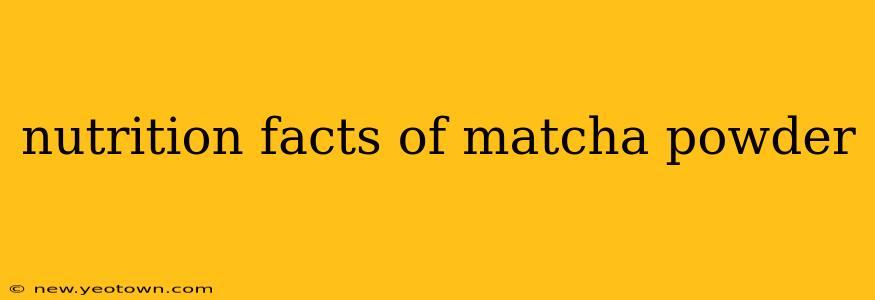Matcha, the vibrant green powder derived from finely ground green tea leaves, has exploded in popularity. But beyond its trendy status lies a nutritional powerhouse packed with benefits. This isn't just another health fad; matcha offers a unique blend of nutrients that support overall well-being. Let's delve into the fascinating world of matcha nutrition, exploring its composition and answering some common questions.
What are the key nutrients in matcha powder?
Matcha's nutritional profile is impressive. Imagine a concentrated dose of everything beneficial in green tea, but amplified. One serving (around a teaspoon) typically provides a significant amount of antioxidants, particularly catechins, especially epigallocatechin gallate (EGCG), known for its potent antioxidant and anti-inflammatory properties. It's also a good source of fiber, vitamins (like vitamin C and vitamin K), and minerals (such as magnesium and potassium). The amounts vary slightly depending on the grade and cultivation methods of the matcha. However, the core benefits remain consistent across high-quality varieties.
How many calories are in a serving of matcha?
A typical serving of matcha powder (about a teaspoon) contains surprisingly few calories, usually less than 20. This makes it a guilt-free way to boost your daily intake of essential nutrients without significantly impacting your calorie count. It's a fantastic addition to a healthy diet, providing energy without the sugar crash often associated with other energy boosters.
Is matcha powder high in caffeine?
Yes, matcha does contain caffeine, but typically less than a comparable amount of brewed coffee. The caffeine content varies depending on factors like the type of matcha and how it's prepared. However, the caffeine in matcha is released more slowly than in coffee, providing a sustained energy boost without the jitters or subsequent energy crash many experience with coffee. The combination of caffeine and L-theanine, an amino acid found in matcha, promotes a state of calm alertness – focus without the anxiety.
Does matcha powder contain sugar?
High-quality matcha powder itself contains virtually no added sugar. However, many commercially available matcha lattes and drinks often contain significant added sugars. Therefore, it's crucial to be mindful of how you consume matcha. Opt for unsweetened preparations or use natural sweeteners sparingly if you prefer a sweeter taste. Remember, the natural sweetness of matcha should be appreciated for its own distinct flavor.
What are the potential health benefits of matcha powder?
Beyond its impressive nutrient profile, matcha is associated with a range of potential health benefits. These include improved brain function (thanks to the caffeine and L-theanine combination), boosted metabolism, enhanced immune function, and potential protection against chronic diseases. However, it's crucial to remember that while studies are promising, more research is needed to confirm these benefits fully. Always consult with a healthcare professional before making significant changes to your diet, especially if you have underlying health conditions.
How much matcha powder should I consume daily?
The recommended daily intake of matcha is generally considered to be one to two teaspoons. Starting with a smaller amount and gradually increasing it allows your body to adjust to the caffeine and other active compounds. Listen to your body and adjust your intake accordingly. Excessive consumption could lead to unpleasant side effects like anxiety or digestive issues.
This exploration into the nutritional powerhouse that is matcha powder hopefully sheds light on its benefits and its place in a balanced diet. Remember to always choose high-quality matcha and prepare it mindfully to fully reap its nutritional rewards.

